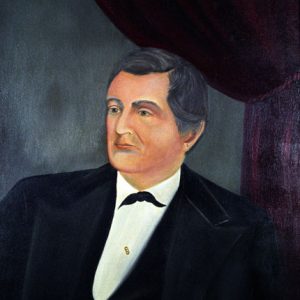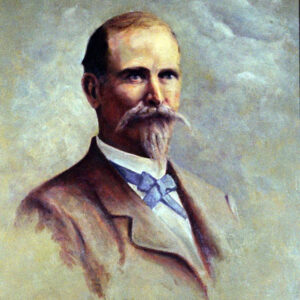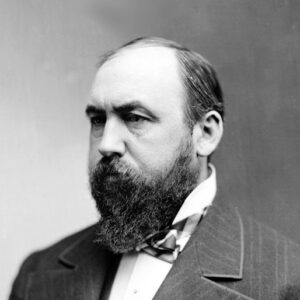calsfoundation@cals.org
Minstrels [Political Faction]
By 1872, the hopes of reconstructing the South along Republican political lines were waning. The Arkansas Republican Party, like the national party, suffered a schism that threatened to end the party’s political dominance in the state. Two groups within the state party—the Minstrels (aligned with the national Republican leadership) and the Brindletails (aligned with the Liberal Republican movement)—fought for control of the governor’s office. The Minstrel faction, allegedly named due to the past profession of one of its members, relied on newcomers (often pejoratively labeled “carpetbaggers”). This group, including men such as Stephen Dorsey, John McClure, and Thomas Bowen to name a few, coalesced around Governor Powell Clayton and the political machine he controlled. By the gubernatorial election of 1872, the battle lines were drawn and Elisha Baxter emerged as the Minstrel or regular Republican nominee for governor. He faced no organized Democratic or conservative opposition, as many Democrats backed the Brindletail candidate for governor, Joseph Brooks.
According to historian Thomas DeBlack, the battle for the governor’s office was as much personal as political. Many native or “Unionist” Arkansans had tired of political domination by men they perceived as outsiders. Furthermore, many Brindletails viewed the Clayton, or Minstral, wing of the party as corrupt. Baxter and the Minstral faction had a major advantage (control of the electoral system), which proved to be pivotal. This was the result of having the power to appoint registrars and election judges throughout the state. The election was marred by fraud and intimidation, but official returns showed Baxter winning 41,681 to 38,415. Minstrels, or regular Republicans, also retained control of the state legislature, and Ulysses S. Grant, the regular Republican presidential candidate, defeated Horace Greeley, the Liberal Republican candidate. Later, Congress invalidated the state’s electoral votes on a technical issue.
Once in the governor’s office, Baxter began switching positions to accommodate conservatives who had backed him during the election, leading some Minstrels to plot Baxter’s removal from office. The ensuing battle became known as the Brooks-Baxter War. Following the conflict and the eventual end of Republican rule, Clayton and his Minstrel allies continued to lead a weak patronage version of the Arkansas Republican Party.
For additional information:
DeBlack, Thomas A. With Fire and Sword: Arkansas, 1861–1874. Fayetteville: University of Arkansas Press, 2003.
Harris, Rodney W. “Outsiders, Scalawags, and Spendthrifts: The Ideological Battle for Post Civil War Arkansas.” MA thesis, University of Central Arkansas, 2011.
Moneyhon, Carl H. The Impact of the Civil War and Reconstruction on Arkansas: Persistence in the Midst of Ruin. Fayetteville: University of Arkansas Press, 2002.
Rodney Harris
Pocahontas, Arkansas
 Civil War through Reconstruction, 1861 through 1874
Civil War through Reconstruction, 1861 through 1874 Elisha Baxter
Elisha Baxter  Powell Clayton
Powell Clayton  Stephen Dorsey
Stephen Dorsey 




Comments
No comments on this entry yet.